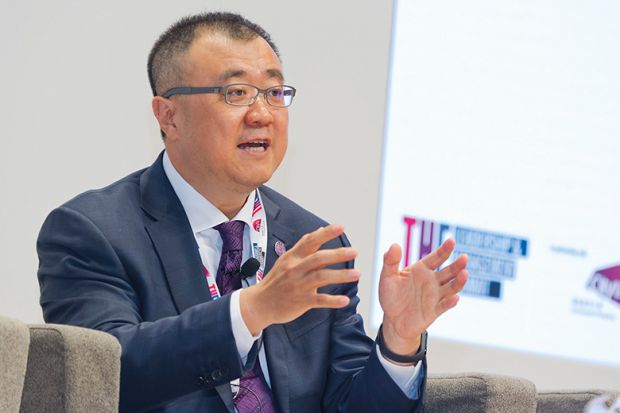Western perceptions of lavishly funded Chinese universities are off the mark, the Times Higher Education Leadership and Management Summit has heard.
Tsinghua University vice-president and provost Bin Yang said Chinese institutions were struggling to deal with shrinking government funding, costly and cumbersome staff benefits, a nascent philanthropic culture that had yet to emerge fully and an alumni base that was still developing.
“Contrary to popular opinion, it is not the case that governments bankroll Chinese universities,” Professor Yang told the summit, hosted by City University of Hong Kong.
“Chinese universities now more than ever before are having to seek donations from outside, and partner with prominent industrial stakeholders and entrepreneurs, as a necessity to remain competitive. Their budget has undergone a fundamental transformation in the past 20 years, with far less reliance on government funds.
“This has implications on university management processes, talent recruitment and much more. It’s increasingly challenging to manage this transformative change.”
Professor Yang said that under a Chinese Ministry of Education mandate, Tsinghua’s tuition fees had not risen since 1995 and were in effect “frozen” at Rmb5,000 (£580) a year for undergraduate students.
Generous employment and retirement benefits were another example of the “unique financial challenges” in the sector, he said. It was “very difficult” to shed staff, he added.
Universities were also obliged to provide low-cost accommodation for students and faculty, Professor Yang said. “The sustainability of these practices now is questionable.”
The Tsinghua leader said that although the central government continued to subsidise universities, it was doing so “less and less”. Research funding depended on student “scale”, with financial support allocated “according to how many students you [have] rather than any other criteria”, he said.
The country’s universities were embracing Western methods of fundraising, Professor Yang said, but “we have to remember that philanthropy is something that has only recently begun to take a strong hold in China”.
“Before the reform and opening-up policy 40 years ago, Chinese alumni didn’t have the capacity to donate,” he explained.
Nevertheless, efforts to develop alternative revenue streams were bearing fruit, Professor Yang said, giving as an example Tsinghua’s executive MBA programme, launched early last decade, which had delivered greater resources to the university.
“This kind of programme typically attracts students in their forties and fifties who already have led successful enterprises,” he said. “They are company owners and founders. They have become important donors in providing scholarships, chair professorships and even teaching facilities.”
Some 70 per cent of donations to Tsinghua came from “friends” with Chinese heritage who lived in places such as Hong Kong, Macao, Indonesia and Malaysia. But this too was set to change as alumni became entrenched in overseas hotspots of entrepreneurialism.
Professor Yang said there were now 4,000 Tsinghua alumni in Hong Kong and 14,000 in Silicon Valley. “When more of them start their own companies and become more entrepreneurial, that will be promising for future contributions,” he added.
john.ross@timeshighereducation.com
POSTSCRIPT:
Print headline: ‘We have budget troubles too’
Register to continue
Why register?
- Registration is free and only takes a moment
- Once registered, you can read 3 articles a month
- Sign up for our newsletter
Subscribe
Or subscribe for unlimited access to:
- Unlimited access to news, views, insights & reviews
- Digital editions
- Digital access to THE’s university and college rankings analysis
Already registered or a current subscriber? Login









